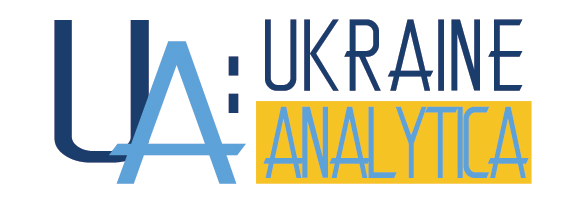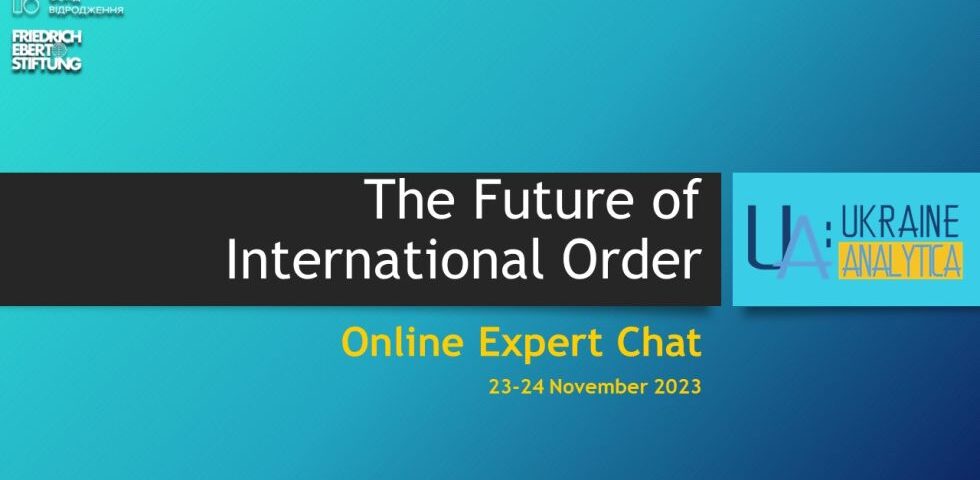Online Expert Chat,23-24th November 2023.
References to the notion of ‘international order’ have become a commonplace in expert discussions and political rhetoric. Rules of the game in international politics are under challenge as the world is moving through series of crises. Well-known norms, institutions, and principles are insufficient or even obsolete. It might seem that deep structural transformations in international politics are opening a new stage for competition over hegemony.
These transformations and such a struggle deeply impact international security by weakening multilateral institutions, undermining regimes, and lowering trust among states. States respond by turning to values, strengthening alliances, engagement in regional conflicts. All that is happening against the backdrop of the weakening of democracy, the rise of populism, and the return of history – most of all in manifestations of the Russian-Ukrainian war.
Participants
- Vladyslav Faraponov, Internews Ukraine, Rubryka, Institute of American studies (Ukraine)
- Oleksii Voloshyn, Legal Specialist, UNDP (Ukraine)
- Yehor Brailian, Analyst, Research Center, Detector media (Ukraine)
- Vitaliy Yarmolenko, National Institute for Strategic Studies(Ukraine)
Moderator – Dr Mykola Kapitonenko, Co-Editor at UA: Ukraine Analytica, Associate Professor at Kyiv Institute of International Relations, Ukraine
The event is organized by UA: Ukraine Analytica. This project is supported financially by the International Renaissance Foundation.



Dear colleagues and friends!
Let me invite you to our discussion about the future of the international order. The topic is hot and important. It is waiting for our contributions.
Questions will appear one by one; your comments and replies are highly welcome. I’ll keep moderating the discussion.
Morning to everyone.
Here’s the first question for us to consider: What’s a ‘rule-based international order’ and why is it at risk?
This is a concept many experts and decision-makers are often referring to. But what are those rules? Who’s challenging them and why? And is the world today in disorder?
United Nations Charter serves as a constitution of the current rules-based order. It was a response to the horrors of the WW2 and the war as a means of solving international disputes. The main basis of the new world is that war is no longer treated as a civilized way of solving disputes and is treated as a violation of agreed rules. The UN Charter also contains the decision-making rules on maintenance of international peace and security that spins around the UN Security Council and the General Assembly. The rules were formed mostly by the winning powers of the WW2… Read more »
Guess, those are telling examples. The UN has been (and still is?) one of the institutional pillars of the international order which emerged after WW2. But hasn’t that order faced similar challenges before? If a war is illegal/prohibited, why were so many of them at times when the UN already existed? Anyway, it must be something else attached to the erosion of the international order. Opening with the UN is a good way to go.
Order, indeed, has been challenged previously many times. Collision between right of self-determination and right of territorial integrity inscribed in UN Charter still carries risks of actual and potential turmoil. This incurs additional issues of human rights, genocidal rhetoric built on the fringe ethnic, ideological and religious radicalism. These aspects are leveraged by other powers that peruse their own interests favored upon common international rules. Thus realism, or eventual realpolitik, of nation states during striking crisis undermines imperfect supranational system.
Well noted. It seems like international orders are always challenged by the dynamics of the balance of power. In fact, it is a difficult task: to construct an order which is stable and just. Gonna be one of the challenges in dealing with post-war issues.
Dr. Kapitotenko, Oleksii, and Vitaliy let me also share my observations. When discussing the disorder of the international order, we should always remember who the creators of the certain system of international relations are. Nowadays, we have the winners of WWII, who created the current system, including the UN. At the same time, this type of system does not have a place for cases where the winners are the violators.
I’ve just discussed the issue with the students today. Was interesting to note that potential to frame the rules can be seen as a part of victory.
In this context, I was always curious if there any thing that would force them to change the current system.
Meanwhile, I’m putting forward another question. Why are democracies getting weaker?
Before 2008 we used to live under the trend of democratization. Spread and growing sustainability of democracies seemed to be a way for a more secure world. But somehow that didn’t happen. What went wrong?
Perhaps, answer may depend on what to be considered as democracy. Liberal, consolidated democracy obviously has been getting weaker due to failures to communicate its strategy on management of financial crises consequences. Populism turned to be an attractive response to popular economic needs, although it could not necessarily suggest an exclusively efficient way out. Personalistic charisma combined with conservative or far-leftist rhetoric combined with favorable information venue designed to maintain popular approbation may endure along with democratic institution and rule of law. However, sensitivity to support from wide strata of society gets populists to make less consistent decisions. Any opposition… Read more »
One of suggestions used to be linked to economic inefficiency, especially at times of crises. Democracy is expensive, and at times of economic turmoil countries lack money to sustain institutions. But that’s only one of possible explanations.
Not to mention theories of democratization, I think the reason for the decline in democratization is that there are examples of states with high state capacity that are not democracies or have “low democratization.”
Even though, that non-democracies will still designate their systems as “democratic”, or even “genuine democratic”.
I’d like to address the 2008 line – the global financial crisis. People like mentioning that living after 1991 was like “the end of history”. It was deemed as an ultimate win of capitalism. 2008 undermined that vision seriously, it undermined the trust in free markets and contributed to the rise of populists that colleagues mentioned in this thread.
Good morning.
Here’s the first question for today’s discussion:
How is the struggle for hegemony impacting international security?
Ultimately, it makes the world less secure. In more direct fashion, the russian war of aggression against Ukraine is the most radical expression of international security disruption. In less direct fashion, it may disrupt markets, as the competition between the US and China shows, including processes of decoupling of economies or arms race and tensions around Taiwan. Current biggest rivals undermine each other and create opportunities for the new challengers, as is evident in case of Indian rise (still in progress but with greatest potential, in my opinion).
Thank you, Oleksii. I can only think of adding a power transition theory perspective in a sense that as the gap between a hegemon and a challenger closes, additional drivers for escalation appear. Specific role in the process is played by the window of opportunity and zero-sum game losic.
Hello
And I’m suggesting one more topic to discuss in our expert chat: the Russian-Ukrainian war as a critical point for the future international order.
International rules are being broken down by Russia in a war against Ukraine; and at the same time this war is about ‘Zeitenwende’. How the result of the war will shape the global future?
It will further undermine the position of classical veto-possessing states and empower the growing powers. This process will be slow but inevitable. It will go in such possible directions: reviewing the veto-right (Liechtenstein initiative on accountability in this regard serves as an important step forward); potential widening of the Security Council membership (however that would not solve anything without the review of the veto right itself); real enforcement of the Article 27 of the UN Charter to force the party of the dispute out of the decision-making in the UN Security Council; further strengthening of the General Assembly amid… Read more »
Thank you for an extended explanation, Oleksii. Sound reasonable.
I’d like to thank all participants for their contribution into the discussion.
Defining the parameters of the future international order is even more difficult than describing what’s wrong with the existing one.
In any case, this issue is fundamental for international security’s tomorrow and the outcome of the Russian-Ukrainian war.
To wrap up. ‘Rules-based international order’ is truly at risk. Its crisis is marked by violations of fundamentals of international law, weakening of international institutions and key regimes. Hard power is back; and international organizations, most notably UN, can do little about it. Once created by winners, the modern international order has no ready made solutions for situations when the they are violators. The crisis of international order is accompanied by the weakening of democracies. For a variety of reasons they are being undermined and replaced by autocracies, with demand rising for various forms of populism. These trends are reinforced… Read more »